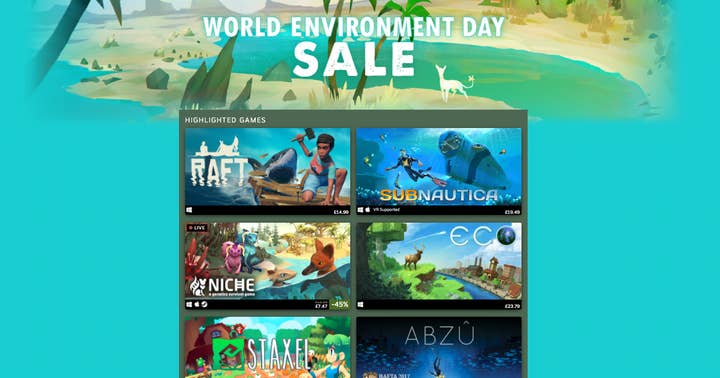Free and easy ways to cross-promote your game
Straw Fawn Studio's Philomena Schwab shares tips on how to work with other developers on your marketing
Independent developers rarely, if ever, have the marketing budget to shout over the noise of larger studios but there are easy ways to amplify your message -- by collaborating with other developers.
This was explored in a Devcom talk by Philomena Schwab, co-founder of Swiss dev Stray Fawn Studio, the team behind Niche: A Genetics Survival Game and Nimbatus: The Space Drone Constructor.
"Developers don't usually have much money and depend on zero-budget marketing," she said. "Things like YouTuber and Twitch streamer marketing, plus social media and community building have become quite common practices. But it's cross-promotion that's still missing from some developers' toolsets, or maybe they are doing it but underestimating what more they can do."

Schwab shared the results of a survey she conducted, asking over 100 indie developers whether they used cross-promotion marketing. More than 60% said they did so regularly, with roughly 10% saying they had tried it once, and just shy of 30% saying they had never done so -- either because ther had "never thought about it" or "couldn't find a suitable partner."
Of the ones who had tried cross-promotion 60% said they were very satisfied and none had reported disappointment.
Schwab offered examples of some of the most popular forms of cross-promotion.
Shout-outs
This was by far the most popular, and perhaps the easiest. It simply boils down to spreading the word about what games your fellow developers are working on.
Schwab offered the example of a shout-out she did for her friend and solo developer Jonas Manke while he was running a Kickstarter campaign for his third-person adventure Omno. Impressed by his visual style, Schwab made GIFs of the game in action and shared them on Reddit.
The post led to a massive spike in Kickstarter pledges, with the day of the post becoming the third most lucrative of the entire campaign, generating over €8,000 for Manke. And it took ten minutes for Schwab to upload the GIFs and make the post.
However, she added: "With Reddit, I advise caution because it can escalate. When I tried the same thing a couple of months later, they accused me of being a PR person because it's impossible that one person could know so many other developers.
"But shout-outs on Twitter, Imgur, Instagram or whatever you have in mind can be very useful -- especially if you are very familiar with the platform that the other person is not."
Exchanging strategies
Schwab is a big advocate of knowledge sharing, especially between indie developers. She recalled a casual lunch she had during a conference with Totally Accurate Battle Simulator developer Landfall, where the team began talking about its Kickstarter campaign.
"Things like YouTuber and Twitch marketing have become quite common practices. But it's cross-promotion that's still missing from some developers' toolsets"
They were experimenting with the idea of making a game mode exclusive to players who signed up to their email newsletter for regular updates -- and, of course, future promotional messages. It worked for Landfall, so Schwab tried it at Stray Fawn and saw similar success.
She became so convinced that knowledge sharing can be beneficial that she set up a games marketing Discord server 18 months ago as a place were studios can discuss and share their ideas.
Themed sales
Last year, Straw Fawn joined a themed Steam sale to coincide with World Environment Day as a way to promote Niche. Another developer of a nature-based game suggested collaborating on such a sale and inviting a few other nature-related games, so the studios pitched it to Steam and over 50 titles joined the promotion.
Schwab reported that not only did the sale go well, it was actually more effective for Stray Fawn than the main Steam Summer Sale. This has inspired her to run more themed sales, including one on Swiss games.
"There's a real opportunity here so go out and grab people making similar games," said Schwab. "They can be similar in theme, genre, nationality, team size -- I'm sure there are lots of things in common you can find with other developers."
Or, she added, you can take this further and create an online event around your theme, as indie publisher Fellow Traveller has done with LudaNarraCon.
Earlier this year, we wrote about how to price your game and thrive during Steam sales.

Tool sharing
Many indie developers are innovative enough to create handy tools for themselves that take some of the leg work out of running a games business, especially the marketing side -- and some are willing to share with their fellow developers.
Pixelmaniacs, for example, made a tool that emails a developer if someone is playing their game on Twitch. This gives them the chance to jump into the chat and connect with the streamer, hopefully winning over a few viewers and potential customers.
Straw Fawn, meanwhile, is currently working on a YouTube and Twitch video tracker to crawl through both platforms, see who's playing its games and gather metrics. Data it takes includes the streamer or YouTuber's number of videos, total views, likes, subscribers, comments and so forth, to help identify potential marketing opportunities. This video tracker will be shared with other developers.
"All of us are making these things for our own use, so why not go ahead and share with others?" said Schwab.
Other options
The above were the four most popular methods of cross-promotion among the developers Schwab surveyed but, she said, there are many more ways studios can collaborate with each other.
Developers on Steam, for example, each have a 'Games of our Friends' section on their store page, so why not reach out to fellow indies when you have a release coming up and asking if you can be included?
Discounts can also go a long way to impressive and converting players who already enjoy similar games. For the launch of Nimbatus, Stray Fawn worked with German developer Boxelware to offer 10% off to players of its own space shooter Avorion during launch week.
"All of us are making these things for our own use, so why not go ahead and share with others?"
"It was really effective, but for some reason Steam is not doing this anymore," said Schwab. "I hope they bring it back."
That's not to say this strategy is no longer effective. You can offer a discount code to be included in other developers' email newsletters -- although Schwab noted this isn't quite as frictionless as Steam users won't see the coupon in their inventory and have to go to the store page to get the discount.
Bundle reward is another option. The developers behind Away: The Survival Series offered a bundle of nature-related games as a reward for the higher tiers in its Kickstarter campaign and offered developers a share of the raised proceeds to take part.
Stray Fawn gave the developer some keys for Niche, earning the studio $500. "And it didn't cost any effort other than sending over the keys and later the invoice," said Schwab.
Building on the idea of themed Steam sales, Schwab suggested themed websites and game communities. While working on Niche, she put together PlayfulOasis.com and a related Slack workspace where developers could post about and discuss nature-related games -- something that was invaluable in populating and driving the World Environment Day sale.
"I don't understand why there aren't more themed websites out there focusing on games with a similar subject, because you can benefit a lot by working with developers making games like yours," said Schwab.
Similarly, themed communities like subreddits or Facebook groups can help reach players interested in a certain type of experience, while social media events can help developers draw attention to each other's games -- examples including #loveindies and #pitchyagame on Twitter.
There are plenty of other ways developers can work together, whether it's putting characters in each other's games or sharing a booth at major events like IndieMegaBooth or Indie Arena. In the case of the latter, not only are you sharing a space but you're also splitting the cost of running a booth.
Finally, on a more basic level, Schwab suggested indies share contact details for YouTubers, Twitch streams and journalists that cover certain types of games -- providing their details are already publicly available, of course. This is information all studios are searching for anyway, so it makes sense that not everyone has to manually compile their own list.
"I also don't understand why we don't have a shared scammer list, because I'm sure a lot of us receive emails from the same people trying to squeeze game keys out of us," she concluded. "It would be so nice if there was a list where we could just search for an email address and see if it's a scammer. That's something we should totally do."

